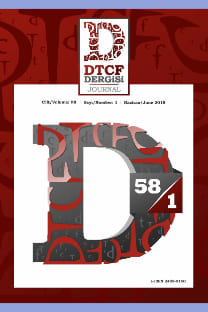IMPEDIMENT TO KNOWLEDGE AND IMAGINATION IN RAY BRADBURY'S DYSTOPIAN NOVEL, FAHRENHEIT 451
Ray Bradbury'nin Distopik Romanı Fahrenheit 451'de Bilgiye ve Hayal Gücüne Engel Bu makale Ray Bradbury'nin distopik romanı Fahrenheit 451'i (1953) eleştirel, bağlamsal ve tematik açılardan incelemeyi ve sunulan totaliter, baskıcı rejimin hayal gücünü ve bilgiyi nasıl engellediğini göstermeyi amaçlamaktadır. Ana karakter, Guy Montag sistemin baskıcı yönünü ve başkaldırmanın sonucunun neler olabileceğini anlamakta oldukça önemli bir rol oynamaktadır. Bu çalışmanın konusuyla bağlantılı olarak, teknolojinin suiistimal edilmesi ve kitapların yasaklanması bireyleri tek tip olarak şekillendirmektedir. Ayrıca, kapsamlı manipulasyon ve kontrol bilgiyi ve hayal gücünü kısıtlamada da etkilidir. Sonuç olarak, böylesi baskıcı bir rejim, sistemin farkına varan isyankâr bireyi toplum dışına itmişse de, tüm vatandaşları tamamen kontrol altına almakta başarısız olmuştur. Başkaldıran bazı karakterler sistemin üstesinden gelemeseler de sistemin başarısızlığını göstermeleri açısından önemlidirler
IMPEDIMENT TO KNOWLEDGE AND IMAGINATION IN RAY BRADBURY'S DYSTOPIAN NOVEL, FAHRENHEIT 451
This article touches upon the critical, contextual and thematic analysis of Ray Bradbury's dystopian novel, Fahrenheit 451(1953) to demonstrate how the totalitarian state envisioned in the book impedes imagination and knowledge. The protagonist, Guy Montag plays a pivotal role in reflecting the oppressive structure of the system and the possible consequences of defiance. The misuse of technology and banning of books shape monotype individuals thereby quite relevant to the discussion of the article. Thorough manipulation and control become instrumental in hampering knowledge and imagination. However, ultimately, such a repressive state does not wholly become successful in manipulating all citizens. The divergent individual whose awareness is aroused is turned into an isolated outcast by the system in this dystopian world. Although certain divergent characters cannot succeed in overcoming the system, they are functional in reflecting the failure of the system
___
AGGELIS, Steven Louis. "Conversations with Ray Bradbury." Diss. The Florida State University, 2003. Electronic Theses, Treaties and Dissertations. Web. 12 Feb. 2015.ARNOLD, Matthew. "Dover Beach." Selected Poetry and Prose. Introduction. Frederick L. Mulhauser. New York: Rinehart & Co., 1953.
BANNERMAN, Helen. The Story of Little Black Sambo. Illus. Florence White Williams. Chicago & New York: Saalfield, 2006.
BOHANON, Cecil E. and W. Allen Hutson. "The Economics of Ray Bradbury's Fahrenheit 451." Annual Conference of the Association of Private Enterprise Education (APEE). Las Vegas, Nevada, 8 Apr. 2008. CMS. Web. 14 Feb. 2015.
BRADBURY, Ray. Fahrenheit 451. London: HarperVoyager, 2008. Print.
COHEN, Stephen F. "Bolshevism and Stalinism." Stalinism: Essays in Historical Interpretation. Ed. Robert R.C. Tucker. New Jersey: Transaction, 1977. Google Books. Web. 11 Feb. 2015. 3-29.
FENEJA, Fernanda Luisa. "Promethean Rebellion in Ray Bradbury's Fahrenheit 451: The Protagonist's Quest." Amaltea. Revista de Mitocritica 4 (2012): 1-20. Pendientedemigracion. Web. 16 Feb. 2015.
FREUD, Sigmund. Civilization and Its Discontents. New York: W. W. Norton, 1962. 1-40. Chrysoma Associates Limited. 26 Apr. 2015.
GIBSON, James L. "Political Intolerance and Political Repression During the McCarthy Red Scare." The American Political Science Review 82.2 (1988): 511-529. JSTOR. Web. 05. March 2015.
HUXLEY, Aldous. Brave New World. London: Vintage, 2004. Print.
KRESSEL, Neil J. Mass Hate: The Global Rise of Genocide and Terror. Colorado: Westview Press, 2002.
MAYNARD, Douglas W. and Steven E. Clayman. "Ethnomethodology and Conversation Analysis." The Handbook of Symbolic Interactionism. Eds. Larry T. Reynolds and Nancy J. Hermann-Kinney. Walnut Creek: Altamira, 2003. 173-202.
MILTON, John. Areopagitica. Vol. III. The Harvard Classics. New York: P. F. Collier & Son, 1909-14. Bartleby. Web. 24 Apr. 2015.
PASCAL, Roy. The Nazi Dictatorship. Vol. 3. London & New York: Routledge, 2010.
PATAI, Daphne. "Ray Bradbury and the Assault on Free Thought." Society 50.1 (2013): 41-47. Springer Web. 18 Feb. 2015.
ROBERTS, Garyn G. "Some Social and Cultural Context for Ray Bradbury's Fahrenheit 451." Critical Insights (n. d.): 27-36. Salempress. Web. 16 Feb. 2015.
RUSSELL, Bertrand. Human Knowledge: Its Scope and Limits. London & New York: Routledge, 2009.
SARGENT, Lyman Tower. "The Three Faces of Utopianism Revisited." Utopian Studies 5.1 (1994): 1-37. JSTOR. Web. 11 March 2015.
SMOLLA, Rodney A. "The Life of the Mind and a Life of Meaning: Reflections on Fahrenheit 451." Rev. Michigan Law Review 107.6 (2009): 895-912. JSTOR. Web. 11 Feb. 2015.,
STOWE, Harriet Beecher. Uncle Tom's Cabin; or, Life Among the Lowly. Boston: John P. Jewett & Co., 1852.
- ISSN: 0378-2905
- Yayın Aralığı: Yılda 2 Sayı
- Başlangıç: 1942
- Yayıncı: Ankara Üniversitesi Dil ve Tarih-Coğrafya Fakültesi
Sayıdaki Diğer Makaleler
IMPEDIMENT TO KNOWLEDGE AND IMAGINATION IN RAY BRADBURY'S DYSTOPIAN NOVEL, FAHRENHEIT 451
UN VOYAGE POST-EXOTIQUE VERS LE BARDO
17. YÜZYILIN SON ÇEYREĞİNDE RODOSÇUK ÖRNEĞİNDE BİR OSMANLI MAHKEMESİNİN İŞ YÜKÜ
KONYA-HATUNSARAY (LYSTRA) VE ÇEVRESİNDEKİ
BİLİM POLİTİKASI ÇALIŞMALARINDA BÜTÜNSELLİK ARAYIŞI VE "TÜRK BİLİM POLİTİKASI 1983-2003"
ALMANCA VE TÜRKÇE AD VERME GELENEKLERİ
"UNO, NESSUNO E CENTOMILA1" ADLI ESERDE GERÇEK ALGISI EINSTEIN VE HEISENBERG İKİLEMİNDE PIRANDELLO
GİOVANNİ VERGA'NIN KARA EKMEK ADLI ÖYKÜSÜNDE RENK MOTİFİ VE KAHRAMANLAR
